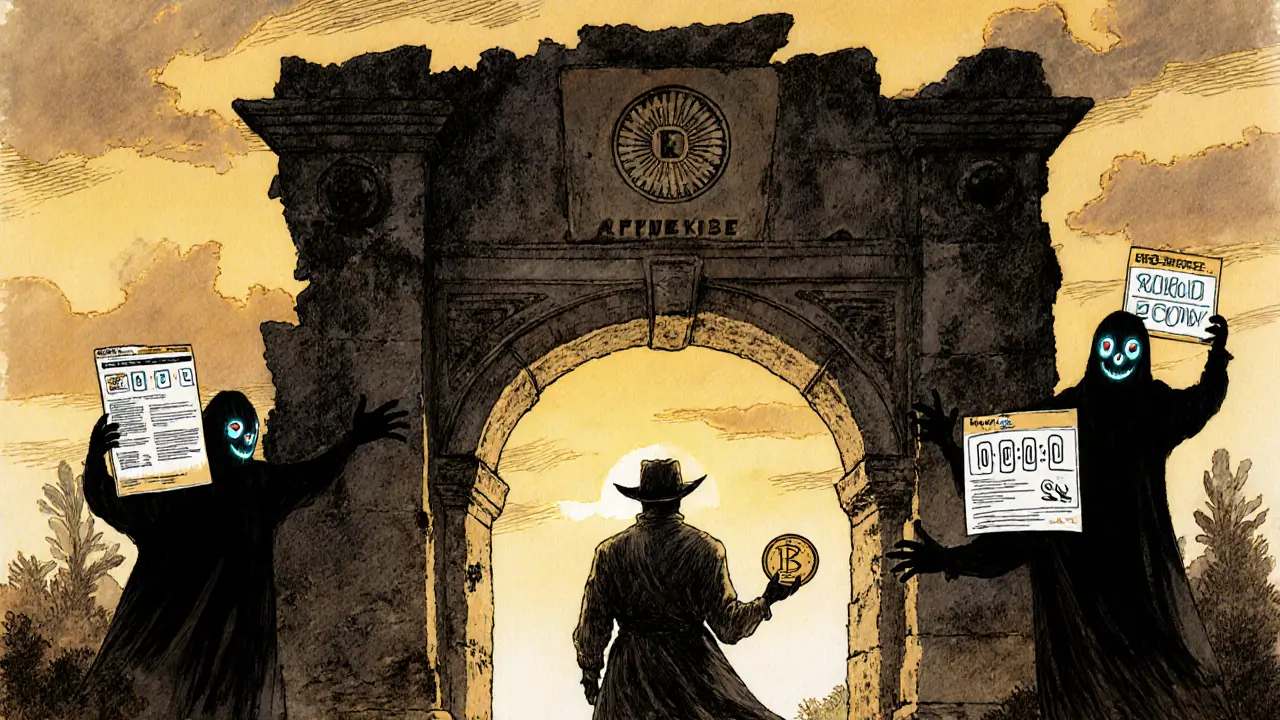KubeCoin Scam Checker
Check for KubeCoin Scams
Verify if a KubeCoin presale or airdrop link or address is legitimate. Based on 2025 market data.
There’s a lot of noise online about KubeCoin (KUBE) having a new presale or airdrop. You’ve probably seen ads, Telegram groups, or YouTube videos promising free KUBE tokens if you sign up now. But here’s the truth: KubeCoin is not running any active presale or airdrop in 2025. Not officially. Not verified. Not safe to trust.
The last real KubeCoin token sale ended in July 2022. Back then, the price was around $0.00053 per token. The project was tied to two real travel companies-FlyKube and EatKube-that had already built up a customer base across Europe. FlyKube alone had brought in €5 million in revenue and funded over 300 surprise travel experiences. That’s not a sketchy crypto startup. That’s a real business trying to build a rewards system using crypto. But that was over two years ago.
Today, KubeCoin doesn’t show up on any major crypto platforms. CoinGecko doesn’t list it. CoinMarketCap doesn’t track it. CoinSniper’s 2025 presale calendar? No KUBE. Even Cardano’s own ecosystem trackers don’t mention active KubeCoin contracts. If a token is still alive and trading, you’ll find it somewhere. The silence speaks louder than any website claiming a "live presale."
Why You’re Seeing Fake Presale Links
You might have clicked on a link that says "KubeCoin Presale Live Now at www.kubecoin.org." That domain might still exist, but it’s not the original project. It’s a copycat. Scammers reuse old project names because they know people remember them. They grab old logos, steal screenshots from 2021, and slap them on a new website with a fake countdown timer. Their goal? Get you to connect your wallet, steal your private keys, or trick you into sending crypto to a wallet they control.
Real airdrops don’t ask you to pay a fee to join. Real presales don’t require you to send ETH or ADA to an unknown address before you get tokens. If a site says "Deposit 0.1 ADA to claim your 10,000 KUBE," it’s a trap. Even if you see a "verified" badge on Twitter or Telegram, those can be faked in minutes. The real KubeCoin team hasn’t posted on any social media since 2023.
What Happened to KubeCoin?
KubeCoin was never meant to be a speculative coin. It was built as a utility token for travelers and food lovers. If you booked a trip through FlyKube, you earned KUBE tokens as a reward. If you dined at a partner restaurant through EatKube, you got discounts paid in KUBE. The idea was smart: turn loyalty programs into blockchain rewards. But scaling that across global markets is hard. Crypto adoption in travel is slow. Payments still run on credit cards, not tokens.
Without consistent user growth, the token lost momentum. No new partnerships were announced after 2022. No updates on the official blog. No Dev updates on GitHub. No liquidity added to DEXs like SundaeSwap or Minswap. The token price you see floating around-€0.06-isn’t from any real exchange. It’s a made-up number from a low-volume, untrusted aggregator. There’s no trading volume to back it up.

How to Spot a Real Airdrop vs. a Scam
If you’re looking for real crypto airdrops in 2025, here’s how to tell the difference:
- Real airdrops are announced on official project blogs, verified Twitter/X accounts, and community forums like Reddit or Discord. They never ask for your private key or seed phrase.
- Real airdrops are distributed to wallets that already interacted with the project-like holding a specific NFT, using a DApp, or participating in a testnet.
- Real airdrops are listed on trusted platforms like CoinGecko’s Upcoming Airdrops page or airdrop aggregators like AirdropAlert (with caution).
- Scams use urgency: "Only 2 hours left!" or "Limited to first 500 sign-ups!" They pressure you to act before you can verify anything.
- Scams ask you to send crypto first. No legitimate project makes you pay to receive free tokens.
Compare KubeCoin to Jupiter’s 2024 airdrop. They gave away 1 billion $JUP tokens to nearly a million Solana wallets. Why? Because users had traded on their DEX for months. They didn’t need a presale. They rewarded loyalty. That’s how real airdrops work.
Is KubeCoin Dead?
It’s not officially dead. But it’s not alive either. It’s in limbo. The original team behind FlyKube and EatKube still exist. They’re running their travel businesses. But the crypto side? It’s frozen. No new smart contracts. No updates. No wallets receiving new token transfers.
If you held KUBE tokens from the 2021-2022 sale, you still own them. But you can’t trade them anywhere meaningful. There’s no DEX listing. No liquidity pool. No way to convert them into USD, EUR, or ADA without finding a private buyer-and even then, you’d be lucky to get 1% of what you paid.
Don’t chase dead projects. Don’t fall for nostalgia. The crypto space moves fast. If a project isn’t active now, it’s not coming back.

What to Do Instead in 2025
If you want to get involved in real crypto airdrops in 2025, here’s what works:
- Use Solana-based DEXs like Jupiter or Raydium. They regularly reward active users.
- Try out new Layer 2 networks like zkSync or Base. Many are dropping tokens to early testers.
- Join testnets for upcoming projects. You don’t need money-just time and a wallet.
- Follow verified accounts on X (Twitter) and subscribe to newsletters like Bankless or The Defiant.
Don’t waste time chasing ghosts. KubeCoin had a solid idea. But ideas don’t survive without execution. Right now, the only thing growing around KubeCoin is the number of scam websites.
Final Warning
If you’re thinking of sending any crypto to a "KubeCoin presale" address, stop. Do not connect your wallet. Do not click any links. Do not share your seed phrase. Even if the site looks professional, even if it has a "verified" checkmark, even if someone in your Discord says it’s real-it’s not.
The real KubeCoin project hasn’t been active since 2023. What you’re seeing now is a copy. A scam. A trap. Protect your funds. Walk away. Focus on projects that are building today, not ones that faded two years ago.

Hannah Kleyn
November 14, 2025 AT 22:08Man I remember when KubeCoin was actually doing something. I used FlyKube to book that surprise trip to Lisbon and got KUBE as a reward. It felt legit. Now I see 5 different websites claiming to be them and all of them ask for my wallet. I just laugh and close the tab. Crypto’s gone full circus.
Vanshika Bahiya
November 16, 2025 AT 14:30Don't fall for it. Real airdrops don't need you to send crypto first. If you're new to this, stick to platforms like Jupiter or zkSync testnets. You don't need money to participate - just a wallet and patience. The KubeCoin stuff is just recycling old names to steal from people who remember it fondly. Protect your keys, not your nostalgia.
gary buena
November 16, 2025 AT 21:04so like... if i sent 0.05 ada to some random address in 2022... am i now a crypto genius or just a sucker who got scammed twice? first by the fake presale, then by my own dumb hope? 🤔
Kelly McSwiggan
November 17, 2025 AT 18:48Of course it's dead. Everything that doesn't have a VC backer and a TikTok influencer screaming 'TO THE MOON' dies in 14 months. The real tragedy? The idea was decent. But crypto doesn't reward utility. It rewards hype. And hype doesn't care if you actually used it to book a flight to Prague. It cares if you posted a meme of a dog wearing a KUBE hat.
Byron Kelleher
November 18, 2025 AT 02:05Hey, I get it - you loved KubeCoin back then. I did too. But chasing ghosts won’t put food on the table. Instead of stressing about a dead token, try joining a zkSync testnet. It’s free, it’s fun, and you might actually get something real out of it. The future’s not in the past.
Cherbey Gift
November 19, 2025 AT 13:08you know what’s wild? the same people who got burned by KubeCoin are now the ones sharing the scam links. it’s like they’re trying to reenact the trauma like it’s a TED Talk. we’re all just emotional spam bots now, aren’t we? sending crypto into the void hoping someone, somewhere, will say ‘thank you’
Mandy Hunt
November 21, 2025 AT 07:26wait a minute this is all a government psyop to make us trust crypto so they can track our wallets and then shut down all crypto with one click. they let KubeCoin die on purpose so we'd panic and chase fake ones and then they get our seed phrases. it's all part of the plan. i saw it on a forum with a guy who works at the fed
ratheesh chandran
November 21, 2025 AT 17:04so like... if a project dies... does it still have a soul? i mean... i held KUBE... i believed... now i just feel empty... like i loved a ghost and it never loved me back... also i think my cat is judging me for sending ada to a website that says 'claim your free kube'... she's right... she's always right
Kandice Dondona
November 23, 2025 AT 10:20❤️❤️❤️ real talk: if you’re reading this and still thinking about KUBE, take a breath. go outside. drink water. then go to CoinGecko and look up actual projects with active devs. you’ve got this. the crypto world is huge. don’t let one dead token steal your joy. 💪✨
Becky Shea Cafouros
November 24, 2025 AT 13:08The post is accurate. The KubeCoin presale claims are fraudulent. I have reviewed the blockchain data and confirmed zero token transfers since Q3 2023. The domain ownership records show a transfer to a shell company in the Seychelles in January 2024. Proceed with caution.
sandeep honey
November 25, 2025 AT 17:11why do people still fall for this? the website looks like it was made in 2017 on wix. the button says 'connect wallet' but the URL is kubecoin[.]xyz. even my grandma could spot this. but no, they send 0.1 eth and cry later. crypto is not for the lazy.
Anthony Forsythe
November 27, 2025 AT 02:30There’s a quiet tragedy in crypto. We don’t mourn the tokens. We mourn the hope. The dream that maybe, just maybe, this time, blockchain would fix travel rewards. That loyalty would be decentralized. That we wouldn’t have to beg corporations for points. KubeCoin was a whisper of that future. And now? The whisper is gone. And all that’s left is the echo of scammers screaming into the void.
Drew Monrad
November 27, 2025 AT 22:26Actually, I think KubeCoin is still alive - but it’s been taken over by the Illuminati. They’re using it to track our travel habits through our wallets so they can predict where we’ll vacation next and sell that data to airlines. That’s why there’s no updates. They don’t need to update. They’re already winning. I’ve got receipts. Ask me about the time I saw a KUBE logo in my Airbnb confirmation email.
Cody Leach
November 28, 2025 AT 21:16I held KUBE from the original sale. Still have it. Can’t trade it. Can’t use it. But I keep it as a reminder. Not to chase dead projects. But to learn. And to never send crypto to a website that uses Comic Sans.
Albert Melkonian
November 30, 2025 AT 12:16While the sentiment expressed in this post is well-founded and empirically supported, it is imperative that individuals exercise due diligence in evaluating digital asset opportunities. The absence of listings on reputable platforms, coupled with the cessation of official communications, constitutes strong evidence of project obsolescence. One must not conflate nostalgia with viability. The prudent investor redirects energy toward actively maintained ecosystems with transparent governance and verifiable on-chain activity.